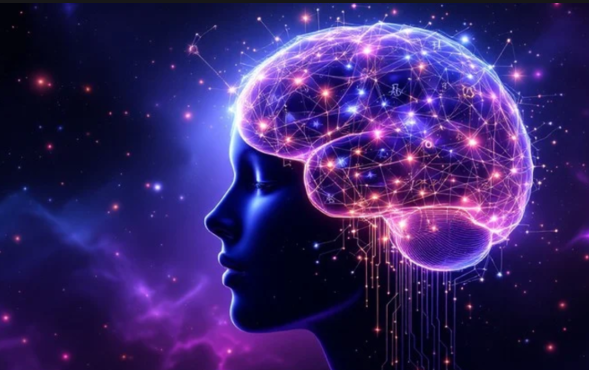Astrology, an ancient system that interprets celestial movements to understand human life, has long fascinated people across cultures. While traditionally used to predict future events or personality traits, astrology has recently gained attention for its potential to offer insights into mental health. Though astrology is not a substitute for clinical psychology or psychiatry, many individuals find comfort, self-awareness, and healing through astrological understanding.
In this article, we will explore how astrology intersects with mental health, the psychological significance of birth charts, planetary influences, and how people use astrology as a tool for emotional well-being.

1. The Psychological Dimension of Astrology
Astrology considers the positions of planets and stars at the time of birth to create a natal chart or Kundali. This chart reflects not only outer circumstances but also inner emotional and psychological patterns. In modern astrology, birth charts are often used as maps of the psyche, similar to a personality blueprint.
Some aspects of astrology relevant to mental health include:
- The Moon sign: Represents emotions, instincts, and subconscious tendencies.
- Mercury: Governs thought processes, communication, and anxiety.
- Saturn: Reflects pressure, discipline, fears, and emotional burdens.
- 12th House: Linked to the unconscious mind, isolation, and hidden emotional struggles.
- 4th House: Connected to inner emotional security and childhood experiences.
When read with sensitivity and psychological awareness, these elements can help individuals recognize their emotional triggers, strengths, and vulnerabilities.
2. How Astrology Supports Mental Health
While astrology doesn’t diagnose or treat mental illness, it can support mental health in several meaningful ways:
A. Self-Awareness and Acceptance
Many people struggle with anxiety, depression, or low self-esteem because they don’t understand their inner world. Astrology offers language and insight into one’s personality, emotional patterns, and life cycles, fostering greater self-understanding and acceptance.
For example:
- A person with a Scorpio Moon may experience intense emotions and need time alone to process.
- A person with a Gemini Mercury may struggle with overthinking or racing thoughts.
Recognizing these tendencies helps people be more compassionate toward themselves.
B. Timing Emotional Cycles
Astrology works with planetary transits and progressions, which mark psychological and life phases. For instance:
- Saturn Return (around age 29–30) is known for emotional challenges, self-reflection, and responsibility.
- Pluto transits may bring up deep transformation, emotional purging, or even identity crises.
- Neptune transits can cause confusion, idealism, or emotional fog, sometimes mimicking depressive symptoms.
Knowing about these phases can reduce fear and help people prepare and cope better with changes.
C. Validation and Emotional Comfort
For many, astrology provides a framework that validates their feelings. Instead of feeling “broken” or “abnormal,” people realize they are going through a phase described by cosmic energies. This validation can be deeply reassuring.
3. Astrology in Therapy and Counseling
Some modern therapists incorporate astrology into their practice, particularly Jungian psychologists, who see astrology as a tool for understanding the unconscious mind and archetypes. Carl Jung, the famous Swiss psychologist, viewed astrology as symbolic and useful in understanding the psyche.
Astro-psychology or psychological astrology focuses on using the birth chart as a therapeutic tool to:
- Understand childhood wounds
- Identify defense mechanisms
- Explore core beliefs and inner conflicts
- Encourage personal growth
Clients may feel empowered when they see their struggles reflected in the cosmos, creating a deeper dialogue with their own inner self.
4. Planetary Influences and Mental Health Themes
Let’s explore how specific planetary placements and aspects may correlate with mental and emotional tendencies:
Moon
- Represents emotional security and childhood.
- A debilitated or afflicted Moon (e.g., Moon-Saturn square) may indicate mood disorders, anxiety, or emotional withdrawal.
Mercury
- Associated with thinking and communication.
- Challenging aspects (e.g., Mercury-Neptune) can indicate confusion, mental fog, or anxiety.
Saturn
- Known for discipline, but also fear and suppression.
- Strong Saturn influence may cause depression, feelings of inadequacy, or social isolation.
Neptune
- Associated with illusion, dreams, and spirituality.
- Neptune afflictions may relate to escapism, substance abuse, or emotional sensitivity.
12th House
- Often linked to mental health struggles, hidden fears, and subconscious patterns.
- Planets placed here may suggest issues with anxiety, isolation, or repressed emotions.
6th House
- Known for health (both physical and mental).
- Mental health disorders can arise from stress or daily habits indicated by this house.
It’s important to remember that astrology should be used as a complementary lens, not as a diagnostic tool.
5. Cautions and Limitations
Despite its benefits, using astrology for mental health requires caution and ethical awareness:
- Not a substitute for therapy: Astrology can’t replace medical or psychological treatment for serious conditions.
- Risk of fatalism: Some people may become overly dependent on astrological predictions, which can limit personal responsibility or promote fear.
- Misinterpretation: Inexperienced astrologers might misread charts and cause confusion or distress.
Always consult licensed mental health professionals for clinical concerns and rely on astrology as a self-help or complementary practice, not a sole solution.
6. Using Astrology for Emotional Growth
Here are practical ways to use astrology for emotional well-being:
Track Moon Phases
- New Moons are good for setting intentions.
- Full Moons reveal what needs to be released or acknowledged emotionally.
Explore Your Birth Chart
- Understand your Moon, Mercury, Venus, and Saturn signs for emotional insight.
- Use apps or consult experienced astrologers to get personalized readings.
Monitor Transits
- Know when challenging or supportive transits are occurring.
- Plan self-care, rest, or action based on cosmic timing.
Use Journaling and Affirmations
- Align journaling or affirmations with planetary movements (e.g., during Venus retrograde, reflect on relationships).
Meditate with Planetary Themes
- Visualize healing during lunar eclipses or meditate on resilience during Saturn transits.
7. Real-Life Experiences
Many individuals report a stronger sense of identity and purpose after exploring their birth charts. For example:
- Someone experiencing depression during their Saturn Return may feel reassured to know it’s a common transformative phase.
- A person overwhelmed by indecision may find clarity by learning they have a Libra Moon, which naturally seeks balance and harmony.
These insights do not “cure” mental health struggles, but they can offer new perspectives and reduce emotional distress.
Conclusion
Astrology and mental health intersect at the point of self-discovery, awareness, and emotional understanding. While not a clinical tool, astrology offers symbolic guidance that many find healing, especially when navigating life’s challenges. A Love Marriage Specialist Astrologer offers guidance using birth charts to resolve relationship issues, overcome family objections, and align planetary positions, helping couples achieve harmony and success in love marriages.
Used mindfully and in combination with therapy, spirituality, or personal growth practices, astrology can become a powerful ally on the journey to mental well-being. Whether it’s recognizing emotional patterns, finding meaning in hardship, or simply feeling more in tune with oneself, the stars may not control us—but they often help us understand ourselves a little better.




